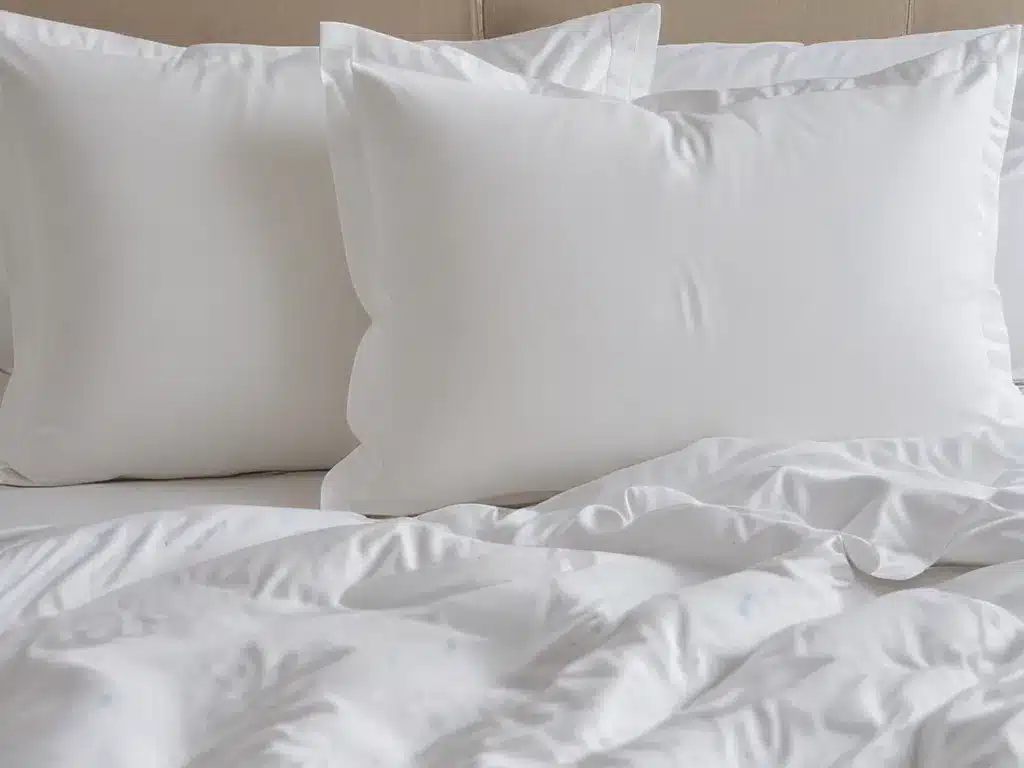Introduction
Washing pillows, comforters, and other bedding regularly is important for keeping them clean and extending their lifespan. Dust, dirt, oil, sweat, and other contaminants can build up on bedding over time. Learn the best practices for washing various types of bedding to get them fresh and clean.
When to Wash Bedding
-
Pillows – I wash my pillows every 3-6 months. Pillows collect sweat, drool, makeup, and hair products that need occasional washing.
-
Comforters – Most experts recommend washing a comforter 2-3 times per year or when it looks dirty. Comforters can collect a lot of sweat and body oils.
-
Sheets – Sheets should be washed weekly or every other week at most. They collect sweat, dead skin cells, and body oils.
-
Duvet covers – Duvet covers should be washed every 2-4 weeks since they come in direct contact with your body.
-
Blankets – Wash lightweight blankets every month during frequent use. Heavier blankets can be washed 2-3 times a year.
Washing frequency depends on usage, if someone is sick, and if you have pets that sleep in the bed. Use your judgement on when bedding needs freshening up.
Preparing Items for Washing
-
Check care labels – Always check the care label for washing instructions. This will indicate if machine washing is allowed, what water temperature to use, and if bleach can be used.
-
Close zippers, hooks, and ties – Zip up zippers, fasten hooks, and tie strings on duvet covers, comforters, etc. This helps prevent snags and damage during washing.
-
Pre-treat stains – Use a stain remover or spot cleaner to pre-treat any visible stains before washing. This improves your chances of removing them.
-
Use a gentle detergent – Choose a gentle, hypoallergenic liquid detergent without dyes or fragrance. Standard detergents can be too harsh for bedding.
-
Use laundry bags – Place pillows or delicate items inside a laundry bag. This prevents damage to the items during washing.
Washing Pillows
Always check the care label first. Many polyester and down-alternative pillows are machine washable. Here are some tips:
-
Wash two pillows together for balance. Use a gentle cycle with cold water.
-
Add a mild detergent without bleach or fabric softener. These can coat the filling.
-
For down or feather pillows, use a front loading washer on the delicate cycle with tennis balls.
-
Dry pillows on low heat in the dryer. Remove promptly when dry to avoid over-drying.
-
For down or feather pillows, air dry completely. Tennis balls in the dryer can damage feathers.
I wash my pillows every 4 months to keep them fresh. It makes a big difference for sleep comfort.
Washing Comforters
Check the care label first. Most comforters can be machine washed but may require special handling based on size.
-
Wash on a gentle cycle in cold water with a mild detergent. No bleach.
-
Large comforters may require a commercial washer at a laundromat.
-
For down comforters, use a front loading washer on delicate with tennis balls. No fabric softener.
-
Dry comforters on low heat and remove immediately when dry. Down comforters should be air dried.
-
For large comforters, take them to a laundromat with large commercial dryers.
I wash my comforter 2-3 times per year since it collects a lot of sweat and oils. Proper washing keeps it fluffy and clean.
Washing Sheets
Cotton, polyester, and linen sheets can all be machine washed. Follow these steps for best results:
-
Use the hottest water recommended on the care label with a mild detergent. Hot water sanitizes.
-
Wash sheets separately from other laundry. Soil can transfer onto them.
-
Avoid using fabric softener or dryer sheets. These leave residue on sheets.
-
For stains, pre-treat with an enzyme-based cleaner before washing.
-
Tumble dry on low heat and remove promptly to prevent over-drying.
I launder my sheets weekly in hot water to kill germs and keep them fresh for better sleep.
Drying Bedding
Proper drying is key to keep bedding clean, soft, and breathable.
-
Always follow care label drying guidelines. High heat can damage fabrics.
-
For down bedding, air dry completely to preserve loft and prevent damage.
-
Dry lightweight bedding on low heat. High heat can cause shrinkage.
-
Clean the dryer lint filter before and after drying bedding to increase airflow.
-
Remove items immediately once dry. Over-drying causes damage.
-
Fluff comforters and pillows when removing from the dryer to restore loft.
In summary, washing bedding takes a bit more care than regular laundry. Always check labels, launder using a gentle cycle, air dry or dry on low, and promptly remove items when dry. With proper washing, your bedding will stay fresh and comfortable for many years. Sweet dreams!







